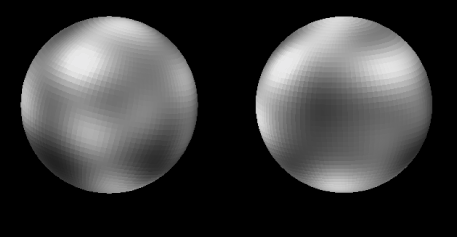
This is what Hubble can see.
Its size and orbit are the main reasons it should be demoted from planet to "something else."
Posted on 07/30/2005 12:09:55 AM PDT by Srirangan
A US astronomer has said he had discovered a 10th planet in the outer reaches of the solar system that could force a redrawing the astronomical map.
If confirmed, the discovery yesterday by Mike Brown of the respected California Institute of Technology would be the first of a planet since Pluto was identified in 1930 and shatter the notion that nine planets circle the sun.
"Get out your pens. Start re-writing textbooks today," said Brown, a professor of planetary astronomy, announcing what he called "the 10th planet of the solar system," one that is larger than Pluto.
"It's the farthest object ever discovered to orbit around the sun," Brown said in a conference call of the planet that is covered in methane ice and lies nearly 15 billion kilometers (nine billion miles) from Earth.
"I'd say it's probably one and a half times the size of Pluto," he said from CalTech, based in Pasadena, near Los Angeles, referring to what until now has been the most distant planet in earth's solar system.
Currently about 97 times further from the sun than the Earth, the celestial body tentatively called "2003-UB313" is the farthest known object in the solar system, and the third brightest of the Kuiper belt objects.
It is a typical member of the Kuiper belt, but its sheer size in relation to the nine known planets means that it can only be classified as a planet, Brown said.
The astronomer conceded he and his team did not know the exact size of the new planet, but its brightness and distance tell them that it is at least as large as Pluto, which measures 2,302 km in diameter.
The size of an object in the solar system object can be inferred by its brightness, just as the size of a faraway light bulb can be calculated if one knows its wattage, he explained.
"We are 100 per cent confident that this is the first object bigger than Pluto ever found in the outer solar system."
But Brown conceded that the discovery would likely rekindle debate over the definition of the term "planet" and whether Pluto should still be regarded as one.
Critics have long questioned whether Pluto, which resembles objects in the Kuiper belt, is actually a planet.
Brown discovered what could be a new addition to the universe known to man along with colleagues Chad Trujillo, of the Gemini Observatory in Mauna Kea, Hawaii, and David Rabinowitz, of Yale University, on January 8.
The planet was first spotted on October 31, 2003 with the Samuel Oschin Telescope at Palomar Observatory near San Diego, California.
But it was so far away that its motion was not detected until the scientists reanalysed the data earlier this year, Brown said.
The astronomers have proposed a name for the "planet" to the science's governing body, the International Astronomical Union, and are awaiting the decision of this body before announcing it.
The planet has not been noticed previously because its orbit is at a 45 degree angle to the rest of the solar system, he said.
"We found it because we've looked everywhere else. Nobody looks way up that high. It's tilted way out of plane," he added.
It's cold, distant and frigid.
Planet Hillary Clinton?
lol! .. so do we deport the democrats or the islamofacists to the 10th one?
I had read it was smaller in an earlier article. Cool. Ten planets - a nice even number.
This will piss off the environmentalists to no end.
I hope they use the myths of anybody but Greeks or Romans. Big Kahuna would sound nice.
Planet Hillary Clinton it is.
So is it going to be planet Mike or Brown ?
They should just demote Pluto and end the debate. Or grandfather Pluto with an asterisk that it's not really a planet, and end the debate.
A lot of people are becoming confused by this. There were three massive objects officially reported as discovered in the Kuiper belt in the last day or so. Two are slightly smaller than Pluto at last estimate, and one is unambiguously larger.
Because these were so close together (which is not a coincidence -- internal politics at play), people are confused about what has actually been discovered and many are confusing identical sounding reports with being identical reports..
Until scientists settle the argument on planet/KBO Pluto, there's no sense in calling this other ball of rock "the 10th planet." Indeed, it's more logical to call it "the 2nd largest identified KBO."

This is what Hubble can see.
Its size and orbit are the main reasons it should be demoted from planet to "something else."
Funny...but I'd rather not give that piece of filth any sort of shot at quasi-immortality.
I think "dormant comet" is the most appropriate.
What else could you call a distant ice planet?
If some alien civilization were charting our solar system there is no chance I think that Pluto would get classified as a planet equal to the other eight. Or, if it were, then it'd be a subcategory of some kind. The chart would have four rocky inner planets, four gaseous outer planets, and four iceballs in the fringe.
Personally, I think it's another dormant comet. Call it "Feynman 2005" and let's call it a day.
And that fun ring of asteroids between the rocky inner planets and the outer, unignited stars.

Disclaimer: Opinions posted on Free Republic are those of the individual posters and do not necessarily represent the opinion of Free Republic or its management. All materials posted herein are protected by copyright law and the exemption for fair use of copyrighted works.